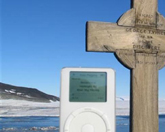French critic Jean-Paul Thibaud has picked up on this notion of the Walkman as nomadic gadget, situating it within “urban tactic that consists of decomposing the territorial structure of the city and recomposing it through spatio-phonic behaviours. Double movement of deterritorialization and reterritorialization. This new nomad is here and there at the same time, transported by the secret rhythm of his Walkman and in direct contact with the place he's walking through” (329).
